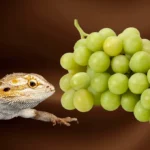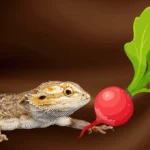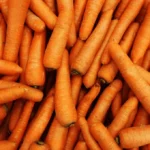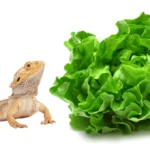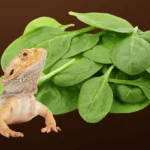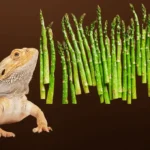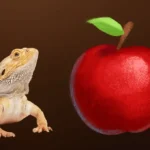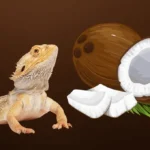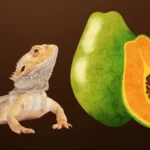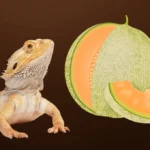Bearded dragons are omnivorous reptiles with a diverse diet that includes insects, leafy greens, vegetables, and fruits. While fruits can be a healthy treat, not all fruits are suitable for bearded dragons. Plums are a popular fruit, but are they a safe and nutritious option for these reptiles?
This article explores whether plums are appropriate for bearded dragons, examining their nutritional benefits, potential risks, and guidelines for safe consumption.
Nutritional Profile of Plums
Plums are known for their sweet flavor and juiciness. Here’s a look at their nutritional content and how it might affect bearded dragons:
Vitamins in Plums
Plums are rich in Vitamin C, which supports immune function and overall health. They also contain Vitamin K, which plays a role in blood clotting and bone health. While these vitamins are beneficial, bearded dragons can obtain similar nutrients from other, more suitable sources.
Minerals in Plums
Plums contain potassium, which helps maintain fluid balance and muscle function. However, plums are relatively low in calcium, which is crucial for maintaining healthy bones and preventing metabolic bone disease (MBD) in bearded dragons.
Fiber Content
Plums have a good amount of dietary fiber, which aids digestion and helps maintain regular bowel movements. Fiber can be beneficial for bearded dragons, but too much can cause digestive issues if not balanced with other foods.
Natural Sugars
Plums are high in natural sugars, which contribute to their sweet taste. While these sugars are not as concentrated as in some other fruits, they can still affect blood sugar levels and contribute to weight gain if fed in large quantities.
Benefits of Feeding Plums to Bearded Dragons
Feeding plums to bearded dragons can offer several benefits when included in moderation:
1. Vitamin C Source
Plums are rich in Vitamin C, which supports the immune system and overall health. While bearded dragons don’t require as much Vitamin C as humans, small amounts of plum can contribute to their overall nutrient intake.
2. Digestive Health
The fiber in plums can aid in digestion and help prevent constipation. Including plums occasionally can support digestive health and maintain regular bowel movements.
Risks and Considerations When Feeding Plums
While plums offer some benefits, there are several risks to consider:
1. Low Calcium Content
Plums have a low calcium-to-phosphorus ratio, which means they provide more phosphorus relative to calcium. An imbalance in calcium and phosphorus can lead to metabolic bone disease (MBD) and other health issues. It’s important to balance plums with calcium-rich foods.
2. High Sugar Content
The natural sugars in plums can contribute to weight gain and other health issues if fed in excess. Bearded dragons are susceptible to obesity if their diet is high in sugary foods.
3. Potential for Digestive Upset
The fiber content in plums, while beneficial in moderation, can cause digestive upset if fed in large quantities. It’s important to offer plums as an occasional treat rather than a regular part of their diet.
How to Safely Feed Plums to Bearded Dragons
If you decide to include plums in your bearded dragon’s diet, follow these guidelines to ensure it is safe and beneficial:
1. Offer in Moderation
Feed plums as an occasional treat rather than a regular food item. Small, bite-sized pieces are best to avoid overconsumption and ensure they are easily digestible.
2. Prepare Properly
Wash plums thoroughly to remove any pesticides or chemicals. Remove the pit before offering the fruit, as it can be a choking hazard or cause digestive issues.
3. Monitor for Adverse Reactions
Observe your bearded dragon after introducing plums to their diet. Look for any signs of digestive discomfort or changes in behavior. If any adverse reactions occur, discontinue feeding plums.
Alternative Fruits for Bearded Dragons
If you’re looking for other fruits that are generally safer and more suitable for bearded dragons, consider these options:
| Fruit | Nutritional Benefits | Feeding Frequency |
|---|---|---|
| Blueberries | High in antioxidants, vitamins | 2-3 times a week |
| Strawberries | High in Vitamin C, moderate sugar | 1-2 times a week |
| Mango | Rich in vitamins A and C, good hydration | 1-2 times a week |
| Peaches | High in vitamins A and C, moderate sugar | 1-2 times a week |
| Raspberries | High in fiber, vitamins, and antioxidants | 2-3 times a week |
These fruits offer a more balanced nutritional profile and can be included in your bearded dragon’s diet more frequently.
Conclusion
Plums can be fed to bearded dragons occasionally, but they should not be a staple of their diet. While plums offer some nutritional benefits, such as Vitamin C and fiber, they also present risks due to their low calcium content, high sugar levels, and potential for digestive upset. To maintain optimal health, ensure that your bearded dragon’s diet is balanced with a variety of vegetables, calcium-rich foods, and occasional fruits. By following these guidelines, you can provide a nutritious and well-rounded diet for your bearded dragon.

